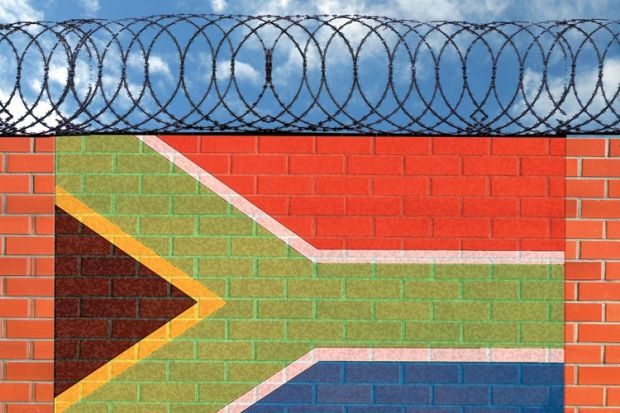Western Cape, South Africa. They say that the climate and the terrain is Mediterranean, but to me it is more like a relentlessly sunny California, buffeted by cooling ocean breezes. Stellenbosch, where I am staying, at the heart of the Cape’s wine country, is a picturesque university town, which is like nothing so much as Santa Barbara. The city of Cape Town in some respects resembles San Francisco, with its hills and flamboyant local culture, in others San Diego, with its beaches and low-flung houses.
But there the comparison ends. You would be hard-pressed to find in California, as you often do here, a modest home surrounded by a 3m tall brick wall, topped by another metre of spiralling razor wire. You would not find any shanty towns. Just a 25-minute drive from prosperous Stellenbosch lies the far end of a crowded township, Khayelitsha, where maybe half a million people live in makeshift shacks pitched on sand. Half the adults there are unemployed. In almost every part of the Cape, people are advised not to go out at night unless they are driving and know where they are going: the murder rate in South Africa is 30 times higher than in the UK.
The buzz in the Western media has South Africa as an “it” place to go, and tourism is booming. I expected to come to a nation full of the energy of hope and good feeling. Democracy and tolerance have arrived. With all its resources, natural and human, including good universities and a social welfare state, South Africa would seem to have a promising future. But what I have found instead is an energy built on frustration, anger and fear, mixed with cheerful fatalism.
I have had the opportunity to hear some of the country’s leading writers and scholars speak on the subject of South Africa today, and I have been astonished. We are living after “a failed revolution”, the poet Breyten Breytenbach told an audience at a book launch for friends of his about the phenomenon of xenophobia, which is very much alive down here. “It is not clear if South Africa is a work in progress or a work in decay,” Mr Breytenbach said.
What intellectuals are most unhappy about is the government. They complain about corruption combined with incompetence and clumsy authoritarianism. Yes, that’s Nelson Mandela’s African National Congress in charge, led now by Jacob Zuma.
To me the society seems jagged. The problem here isn’t, as in the West, structural inequality or, as in much of the rest of the world, a lack of democracy. Everyone here is officially committed to the idea of making society more equal and to governing the country democratically. But there are 11 official languages. There are rural areas without plumbing, urban areas without jobs. There is the trauma of the apartheid past. There is incredible racial segregation still: in social, geographic and economic terms. And no one really knows how to talk about the future.
Unfortunately, South Africa’s economy depends on the same global economy, structured by the same neoliberal logic, as the one that has brought most of us in the West 30 years of wage and employment stagnation. Why the global neoliberalist order, imposed on this jagged social welfare state, should succeed better here than elsewhere no one can say.
Register to continue
Why register?
- Registration is free and only takes a moment
- Once registered, you can read 3 articles a month
- Sign up for our newsletter
Subscribe
Or subscribe for unlimited access to:
- Unlimited access to news, views, insights & reviews
- Digital editions
- Digital access to THE’s university and college rankings analysis
Already registered or a current subscriber? Login

